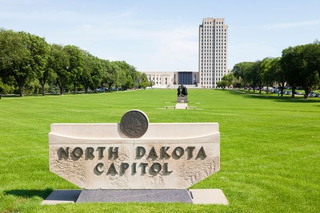
- Details
- By Elyse Wild
BISMARCK, ND — North Dakota lawmakers introduced a bill on Monday that would solidify the rules of the Indian Child Welfare Act (ICWA) into state law.
Representative Jayme Davis, D-Rolette, an enrolled member of the Turtle Mountain Band of Chippewa, is sponsoring House Bill 1536.
 Make A Donation Here
Make A Donation Here
The bipartisan proposal comes as Indian Country awaits the Supreme Court decision on Haaland vs. Brackeen, which will determine the fate of the 43-year-old federal law designed to keep children who are tribal members with Native families. The court heard arguments in November 2022 and is expected to release a ruling later this year. Advocates in Indian Country consider the case to be the most significant threat to sovereignty in modern times.
Davis introduced the bill to North Dakota’s House Human Services Committee on Monday, telling the committee that the law would ensure that Native children grow up with their cultural ties intact. In answering questions from the committee, she distinguished Native Americans as political entities in the eyes of the law, as opposed to a racial group.
“The Supreme Court decision could come down at any time,” Davis said. “It’s important that the state codifies our own ICWA.”
ICWA came in response to centuries of Indian Country being decimated by the forced separation of children and families. Native children were often placed in residential boarding schools and subject to horrific and sometimes deadly abuse.
Congress enacted ICWA less than a decade after the Association on American Indian Affairs found that 25 percent to 35 percent of all Native children had been removed from their families and placed in foster homes, nine out of 10 times with non-Native parents.
Scott Davis (Standing Rock Sioux Tribe), former executive director of the North Dakota Indian Affairs Commission, testified before Monday’s committee in support of the bill. Davis noted that collaboration between states and tribes is essential to protecting sovereignty.
“This bill is another example of how we — states and tribes — have to band together when it comes to federal overreach,” David said. “We’ve seen federal agencies create a once size fits all approach that doesn’t work for states or tribes.”
It’s important for us to keep ICWA law strong and keep this relationship between the states and tribes strong ... this is very, very important to my people, my relatives, our court systems, and our sovereignty.”
All five federally recognized tribes in North Dakota tribes were consulted in drafting the bill.
Eleven states have a version of ICWA codified into law, including Iowa, Michigan and Nebraska.
No one testified against the bill Monday. The panel is not expected to vote on the bill before next week.
More Stories Like This
50 Years of Self-Determination: How a Landmark Act Empowered Tribal Sovereignty and Transformed Federal-Tribal RelationsInterior Finalizes Major Alaskan Land Transfer to NANA Regional Corporation
Justice Kavanaugh Freezes Key Voting-Rights Case on Tribal Vote Dilution in North Dakota
Chemehuevi Cemetery of Twenty-Nine Palms Band of Mission Indians Added to National Register of Historic Places
Las Vegas Man Indicted for Selling Fraudulent Goods Falsely Claimed as Native American-Made
Help us tell the stories that could save Native languages and food traditions
At a critical moment for Indian Country, Native News Online is embarking on our most ambitious reporting project yet: "Cultivating Culture," a three-year investigation into two forces shaping Native community survival—food sovereignty and language revitalization.
The devastating impact of COVID-19 accelerated the loss of Native elders and with them, irreplaceable cultural knowledge. Yet across tribal communities, innovative leaders are fighting back, reclaiming traditional food systems and breathing new life into Native languages. These aren't just cultural preservation efforts—they're powerful pathways to community health, healing, and resilience.
Our dedicated reporting team will spend three years documenting these stories through on-the-ground reporting in 18 tribal communities, producing over 200 in-depth stories, 18 podcast episodes, and multimedia content that amplifies Indigenous voices. We'll show policymakers, funders, and allies how cultural restoration directly impacts physical and mental wellness while celebrating successful models of sovereignty and self-determination.
This isn't corporate media parachuting into Indian Country for a quick story. This is sustained, relationship-based journalism by Native reporters who understand these communities. It's "Warrior Journalism"—fearless reporting that serves the 5.5 million readers who depend on us for news that mainstream media often ignores.
We need your help right now. While we've secured partial funding, we're still $450,000 short of our three-year budget. Our immediate goal is $25,000 this month to keep this critical work moving forward—funding reporter salaries, travel to remote communities, photography, and the deep reporting these stories deserve.
Every dollar directly supports Indigenous journalists telling Indigenous stories. Whether it's $5 or $50, your contribution ensures these vital narratives of resilience, innovation, and hope don't disappear into silence.
 The stakes couldn't be higher. Native languages are being lost at an alarming rate. Food insecurity plagues many tribal communities. But solutions are emerging, and these stories need to be told.
The stakes couldn't be higher. Native languages are being lost at an alarming rate. Food insecurity plagues many tribal communities. But solutions are emerging, and these stories need to be told.
Support independent Native journalism. Fund the stories that matter.
Levi Rickert (Potawatomi), Editor & Publisher

